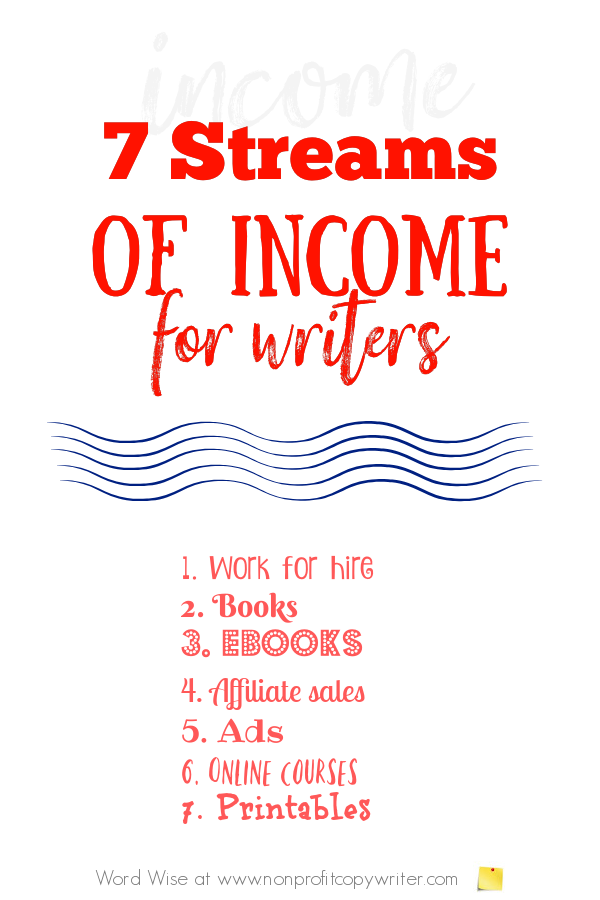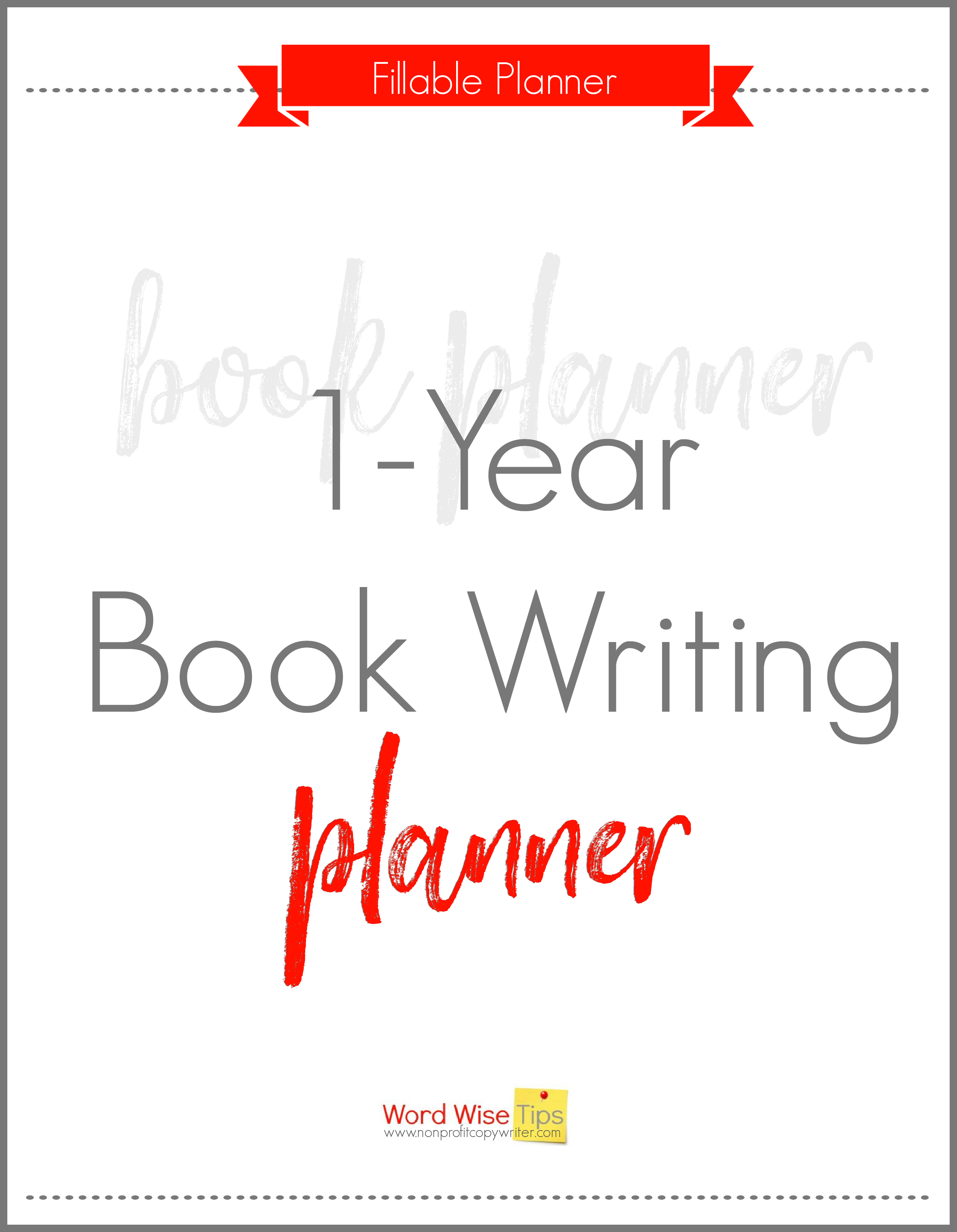Save Time: Get 5 Simple Writing Tips
you can put to use in 10 minutes
7 Streams of Income for Writers
Award-winning writer Kathy Widenhouse has helped hundreds of nonprofits and writers produce successful content , with 750K+ views for her writing tutorials. She is the author of 9 books. See more of Kathy’s content here.
Updated 12.23.25
Smart entrepreneurs don’t put all their financial eggs in one basket. Instead, they build wealth in a variety of ways, following the code practiced by millionaires for decades: maintain at least 7 streams of income. This way, if one source goes sour or narrows to a trickle, the others can help maintain a healthy cash flow.
If you’re a freelance writer, the principle is the same. You can make a good living when you develop several income streams.
An income stream is a source of money. A writing income stream is a source of money that comes from your written content. Money from different payouts flows into your collective pot, combining together to create stability — as in regular income. The variety reduces risk so you’re not solely dependent on sales from one book … followers of a single blog … one major client.
At least 7 streams of income have become my favorites. Try one. Then another and another to build your own steady flow of cash.
7 streams of income for freelance writers
1. Write for hire
Websites … direct mail …brochures …articles …landing pages…grant applications …blog posts. Tabulate all the written content you see each day. When business owners and leaders are too busy to write their own material, they hire someone. Why not you?
To get paying clients, you need to find the businesses and leaders that need help. When I first started freelance writing, I created a promotional package outlining my writing services. I mailed it to 800 prospects in my niche, followed up with each one who returned my reply card, and got my first work-for-hire gigs.
Several of those initial prospects have even turned into long-term anchor clients. Once I started doing good work, I got referrals. You can too.
2. Write books
For a handful of writers, book royalties are a primary source of income. For the rest of us, they provide a stream of cash — and a nice one. A publishing house takes care of all a book’s mundane details from layout to marketing.
I’ve got several books in print through a traditional publisher. My payout isn’t huge. (Yours may be.) But it adds a decent line item to the coffers every year … and all of it as passive income.
3. Self-publish books
While we’re on the subject of books, you needn’t choose the traditional route. You can self-publish without the help of an intermediary. One of the many advantages of self-publishing: I get a royalty check every month through Amazon, rather than once a year through my print publishing house.
The payments aren’t solely from eBooks, either. For your readers who prefer a physical book, accommodate them through print-on-demand. Kindle Direct Publishing allows you to publish your eBook in print three months after it’s digitally live. That means more sales for you. You can choose other publishing platforms, too, apart from Kindle, of course — like Apple or Smashwords.
Write your print or digital book in one year using this planner.
4. Become an affiliate
If you’ve got a website or blog, become an affiliate marketer. Then you can promote other people’s products or services and earn a commission on each sale — passively.
You can generate affiliate commissions in different ways. For starters, you can post ads on your site. When a user clicks through and makes a purchase, you get a piece of the pie. You can also write product reviews and include a link with your affiliate code. Or you can generate affiliate sales by my favorite method — contextual links — in which you reference a product or service in clickable text as part of your content.
Two tips to get you started strong as an affiliate marketer.
- First, accumulate at least 30 well-optimized, solid pages of content on your site before adding affiliate links, and continue to consistently add to your site over time. This signals to the search engines that you are a solid source of information, not a fly-by-night operation, and makes you more appealing to affiliates.
- Take time to choose affiliate programs that offer products related to your subject matter. The more popular of the bunch (Amazon Associates, ClickBank, and Rakuten, for instance) offer an assortment of vendors that are suitable for almost any niche.
5. Join an ad network
Once you’ve built a bit of traffic in your online home, you can join an ad network. In fact, get enough hits and they will reach out to you. That was the case for me.
Think of an ad network as a broker. The network connects businesses that want to run advertisements with websites that wish to host them. That saves you a load of hassle. The network places a bit of code in your site that serves up ads from businesses that bid the highest for the chance to advertise on your site.
To get to that point, write great content. Consistently. Build traffic. Then, businesses will compete for a spot in your online real estate. You’ll get paid without doing anything more than producing quality information for readers in your niche.
6. Build an online course
Post-pandemic, online learning has become the norm. Offer one and you won’t frighten consumers away, but rather attract them. For the writer, an online course is a lucrative source of income given its low overhead and unlimited potential users. Once you’ve created your course, it can live on the web and generate ongoing sales.
One key to online course sales? Don’t repeat the same lectures and lessons that others offer. Create original content on a topic that’s in your wheelhouse.
The idea of producing a full-blown course can be intimidating, but you can experiment by creating a short mini-course and using it as a lead magnet. At the very least, you’ll nab some takers and add them to your email list. Find an online platform that helps you through the process step by step. I use Teachable. I can manage my online courses in my Teachable school and there, I can also offer another product to readers … printables.
7. Create printables
Workbooks, worksheets, checklists, planners, journals, templates, trackers: they’re just some of the printables you can create and sell, no matter what your niche. As the name indicates, a printable is a digital download that users can print out to use. They’re low- or no-cost to create, which means nearly 100% pure revenue. Plus, you can offer a low to high price range for your printables, making them accessible to all kinds of users.
And you needn’t be a graphic designer extraordinaire to create them. Canva and PicMonkey offer simple-to-learn tools. You can save your printable as a PDF and then sell it on Etsy, Teachable, Gumroad, or your own site.
Before I publish my printables, I open the files in Adobe Acrobat DC and format them to be fillable on a computer. This way, users have additional options:
- Print the printables and fill them by hand
- Fill printables on the screen and print the results
- Reuse printables over and over
Other streams of income for freelance writers
These 7 streams of income have helped me develop a full-time freelance writing income. But they are not the only earning options you can choose. There are plenty of other ways a writer can create a dribble — or flood — of incoming cash. You can …
- Create a membership site
- Conduct speaking engagements
- Offer sponsorships for your newsletter
- Ghostwrite
- Provide consulting services
- Become a grant writer
- Offer coaching
- Self-produce audiobooks
- Offer editing services
“Never depend on single income.” So said American business magnate and investor Warren Buffet (b. 1930).
The principle rings true not just for personal wealth building, but also for writers. You might hit gold with a best-selling book or via contracts with a large client or through a lucrative blog. But don’t stop there.
Create multiple income streams. Then you have a solid path to building a steady income. Even while you’re working in a quiet office, playing with words.
More ways to make money writing
How To Create a 1-Page Marketing Plan for Writers ...
Should You Create an Online Course? Yea or Nay ...
The 2 Main Ways to Build Your Freelance Writing Business ...
Do You Need a Writer Website (or an Upgrade)? Take the Quiz ...
Wannabe Writer? Say Goodbye to Your Worst Enemy ...
Make Sense of Marketing: The 4 Ps of Marketing for Writers ...
Branding Basics for Writers (Especially Non-Marketers) ...
Want More Traffic? Cross-Posting Is Easy ...
Two Types of Readers That Pay You To Write ...
Your Writing: Is It “Good Enough”?
5 Tips for Building an Audience When You’ve Just Started Writing ...
The Best Lead Magnet Does One Thing ...
How To Write Your Personal Brand Statement (with an easy template) ...
3 Ways You Can Make Money Writing Content on Your Own Site ...
3 Types of Freelance Writers: Which Are You?
How To Make Money From Blogging: A Quick Tutorial ...
3 Ways to Build an Audience for Next to Nothing ...
30 Money-Making Niche Site Ideas ...
The Best Product to Sell Online (Especially for Writers) ...
Turn One Freelance Writing Job into an Anchor Client ...
Selling Your Services: 6 Writing Tips for Starting Out as a Freelancer ...
More tips for freelance writers on our Pinterest board ...
Return from 7 Streams of Income for Writers to Nonprofit Copywriter home
As an Amazon Associate I earn from qualifying purchases.
Share This Page

Named to 2022 Writer's Digest list
BEST GENRE/NICHE WRITING WEBSITE


Stop Wasting Time!
Grab your exclusive FREE guide, "5 Simple Writing Tips You Can Put to Use in 10 Minutes or Less"













